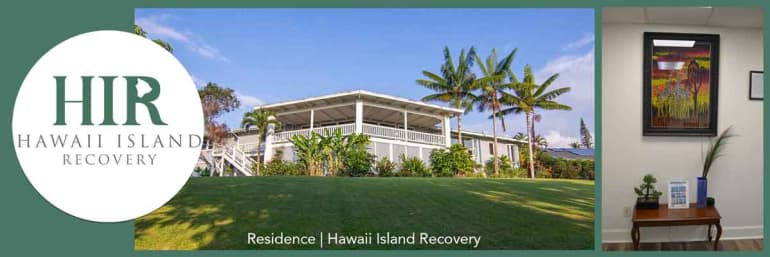For a patient struggling with a substance use disorder (SUD), quitting could feel impossible. Stopping after years of use can be dangerous and often requires detox to manage withdrawal symptoms. The withdrawal phase is especially challenging because your patient’s body will try to convince them that they cannot function without drugs. Therefore, inpatient treatment is best for severe cases of addiction.
Educating your client about our detox program at Hawaii Island Recovery can help them understand the dangers of addiction and the importance of professional treatment. Through this education, you will be able to convey how you can help your patient overcome withdrawal and achieve sobriety.
Withdrawal Defined
Withdrawal is the physical and mental anguish individuals go through when they quit using drugs or alcohol. Withdrawal happens when the body grows accustomed to substances to feel “normal”; therefore, the body makes it feel impossible to live without drugs or alcohol. Symptoms can become so intense that many will want to use substances to relieve them.
While withdrawal will occur during inpatient treatment, trying to quit cold turkey or detox at home can lead to overdose and death. However, a detox program provided in a center for alcohol and drug treatment offers 24/7 support, including medication management, to help monitor and ease withdrawal symptoms. Enrolling in a detox program will ensure your patient is safe and healthy.

To learn about the importance of sleep in recovery, as well as our therapies that address sleep behavior, call HIR at (866) 390-5070.
More infoWithdrawal Symptoms
The symptoms your patient will experience will depend on what kind of drug they use, how much they use, how often they use it, and more. However, common withdrawal symptoms include:
- Changes in mood and appetite
- Restlessness
- Fatigue
- Irritability
- Trouble sleeping
- Muscle pain
- Sweating
- Tremors
- Vomiting
Severe symptoms can also include hallucinations and seizures. Even if the physical symptoms last for a few days or a week, psychological symptoms like depression or dysphoria can last longer.
Hawaii Island Recovery’s Detox Program
The first step to treating addiction is to rid the toxins in the body due to drug or alcohol use. Hawaii Island Recovery offers a risk-free detox program that focuses on the patient’s comfort. Patients will meet with a board-certified addictionologist to assess their needs and determine the best detox protocol. Next, your patient will detox under the medical supervision of our medical director, medical nurses, and resident managers. Once stable and sober, your patient can transition into our Hawaii inpatient drug rehab, where they can embrace true sobriety.
Withdrawal Medications
Depending on what drug your patient used, doctors may prescribe medications to alleviate withdrawal symptoms. Some medications may include:
- Valium
- Catapres
- Ativan
- Methadone
- Buprenex
- Librium
Anti-anxiety medications, antipsychotics, anticonvulsants, and others can treat any nausea or sleep troubles that come from withdrawal. While these medications help treat withdrawal symptoms, they will not treat the root of the addiction. Patients will have to go through a supervised treatment plan with various treatments and therapies that help get to the source of their addiction.

Holistic treatments combined with evidence-based therapeutic modalities can help you effectively heal from addiction. Call (866) 390-5070 to learn more.
More infoRegular Exercise
Exercise can also help patients find relief. Exercise helps release feel-good endorphins that cultivate an overall feeling of well-being. Do not let your patient become discouraged if they cannot sign up for a gym membership or lack access to fitness equipment. Simple activities like going for a walk or a run can reduce drug cravings and enhance patients’ mental health during recovery. Tell your patient to aim for at least fifteen minutes five days a week. Over time, they will be able to increase their endurance.
Sleep Schedule
Sleep is something we all tend to take for granted at times, and getting enough rest will help your patient think clearly and control their cravings. Have your patient go to bed and wake up at the same time. Encourage your patient not to watch TV or exercise right before bed, as such activities can keep them awake.
Holistic Methods
Another way to control drug cravings and withdrawal symptoms is through holistic practices. Some practices include:
- Massage therapy: This therapy uses touch to relieve muscle tension and any physical pain your client experiences during withdrawal.
- Yoga: Yoga can strengthen the mind, body, and spirit.
- Acupuncture: This therapy method helps establish balance, blood flow, and circulation throughout the body.
- Equine therapy: Equine therapy can help your patient connect with their feelings through bonding with horses. Make sure that your patient incorporates holistic practices with other traditional modes of treatment like individualized and group therapy.
Maintain Healthy Communication
Addiction can make your patient bottle up emotions and use substances as an outlet to cope with difficult emotions. Speaking to a loved one or a therapist can help your patient feel much better in alleviating their worries. Through counseling, your patient can learn about various coping techniques for their withdrawal symptoms and mental health. Soon, your patient will also be able to turn negative thoughts into positive thoughts.

Withdrawal can be the most uncomfortable part of addiction, but it is necessary to achieve sobriety. At Hawaii Island Recovery, one of the leading treatment programs in Hawaii, we provide professional care to help diagnose and lead patients through detox. Our staff remains on-site 24/7 to ensure that patients have the resources they need when they need them. Such resources include providing tools to help them manage cravings, regulate mood, and build lasting relationships that they can develop well into recovery. We also provide medication treatment and management to patients with severe withdrawal symptoms. Once sobriety is reached, patients can transition into our residential program, where they will continue to develop tools they can use to face real-world challenges. Finding treatment with us is always a phone call away. To help your patients get started on their path to recovery and learn more about our program, call Hawaii Island Recovery today at (866) 390-5070.
 Hawaii Island Recovery
Hawaii Island Recovery 








